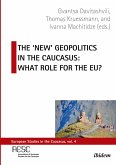The geopolitics of post-communist Europe are not only important for Ukraine itself, but ultimately also for the future of the continent as a whole. This concerns the interactions between Kyiv, on the one hand, and the capitals of East-Central Europe as well as the Southern Caucasus, on the other. Where does Kyiv currently stand geopolitically and how should it engage in the region between the Baltic, Adriatic, Black, and Caspian Seas? This volume examines which interests and motivations some select countries in East-Central Europe and the Caucasus have towards Ukraine and provides answers to the question which chances there are for new multilateral networks or structures. Such multilateralism around Ukraine could go beyond the already existing, yet geographically and functionally circumscribed Organization for Democracy and Economic Development (GUAM), the Visegrad Four, the Bucharest Nine Group, and the Three Seas Initiative. The volume also illustrates how the ever-present "elephant in the room"-Russia-shapes the international relations of the post-Soviet space. Researchers from several post-communist countries examine these issues from their specific points of view.
Bitte wählen Sie Ihr Anliegen aus.
Rechnungen
Retourenschein anfordern
Bestellstatus
Storno








